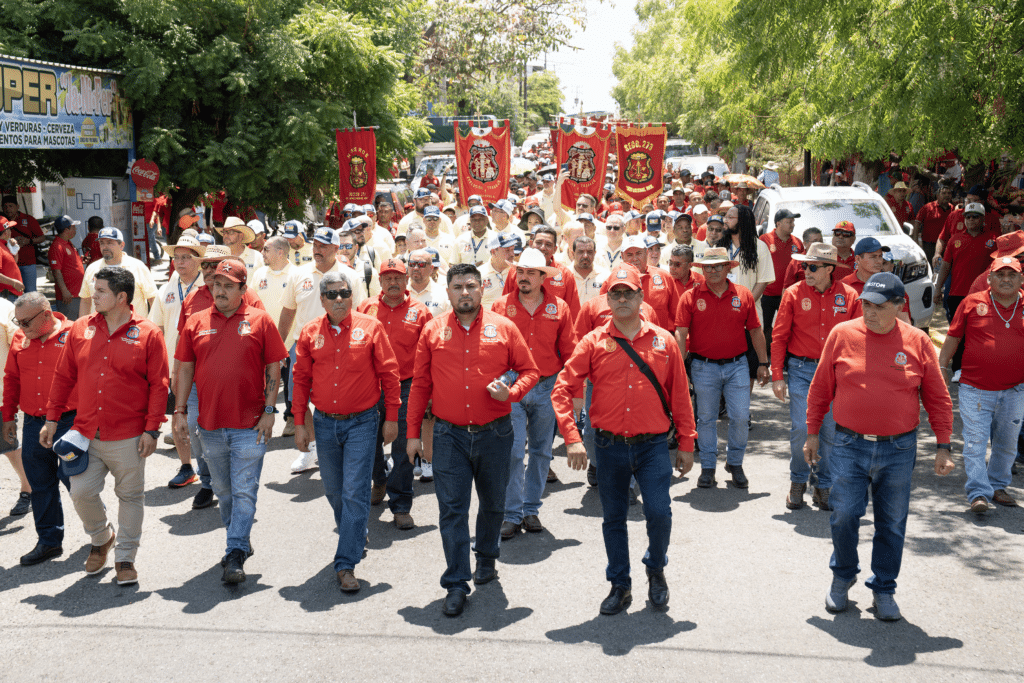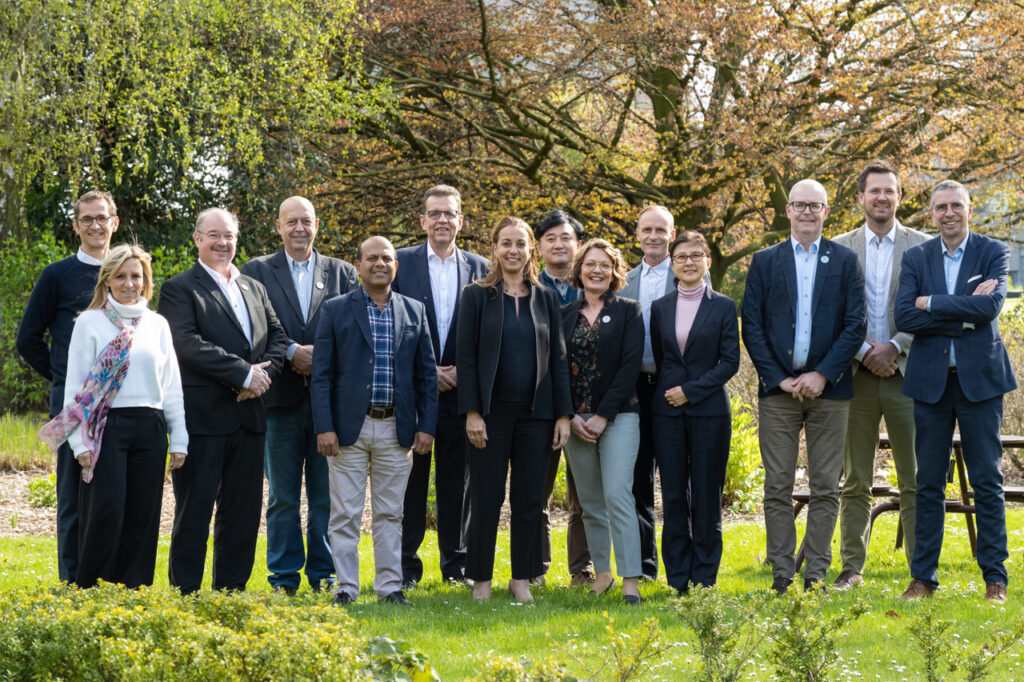Prepared Statement of Leo Gerard for the Steel Caucus Hearing on the State of the Steel Industry
Click here to download this as a PDF.
Chairman Lamb, Vice Chairmen Bost and Crawford. Thank you for the invitation to appear here today.
I’m here today to say that the state of America’s steel industry is in a recovery. We should be proud of the workers who over the past decades have demanded action by their government, and who produce the steel every day. They are the real heroes in this story.
But, on a cautionary note, that recovery is in jeopardy and our work is far from over. Now is not the time to do a victory lap as this industry is constantly under attack – not only from the cheating off-shore competitors, but also right here in Congress where certain Members of Congress are seeking to limit the President’s authority to protect national security. They would unilaterally return the fate of America’s steel and other key industries to the whims and schemes of foreign governments and off-shore producers. Why would we ever consider disarming ourselves in such a manner? Disarming is an act of economic foolishness driven by the same narrow interests who first put this industry and tens of thousands of American workers and communities in such jeopardy.
The Section 232 tariffs on steel have had a positive impact on production, employment, and investments here in the U.S., as the underlying statutory authority for the tariffs anticipated. The Administration’s recognition, as every American has long fully appreciated, is that steel is the backbone of our economic and national security. That recognition has led to relief measures that have supported thousands of jobs directly and tens of thousands of jobs indirectly. The same story is true for aluminum.
The U.S. industry has recaptured significant market share since April of 2018 as the share of the market captured by finished steel imports decreased from 29.3 percent to 21 percent by November 2018. This change reflects the ability of U.S. companies to sell domestic steel to domestic companies without the unfair competition of state-owned or dumped and subsidized steel. America’s steel companies sold over five million more tons of steel in the last year. The 232 relief is allowing companies to rehire, recapitalize, refurbish and stand at the ready to provide the steel products necessary for our country’s defense and its critical infrastructure. Equally important for the 31,000 plus USW members who ratified new agreements at companies like ArcelorMittal and U.S. Steel, we were able to maintain their healthcare benefits and decent middle class wages.
But, the underlying problem of Chinese overcapacity continues to plague world markets and is a sword of Damocles hanging over the future of our industry and those in other market economies. The 232 tariffs must not be discontinued, and they should be coupled with renewed efforts to reach multilateral disciplines on overcapacity, largely fueled by China which, in October, had the highest production levels on record. Since the U.S. took action, the European Union and Canada have also taken safeguard actions or raised tariffs on steel goods. India’s Ministry of Industry is currently debating setting a minimum price for multiple steel products as well. Meanwhile Congress must recognize that China’s statements acknowledging the problem and its promises to continue to address its overcapacity, must be added to the lengthy list of its broken promises and empty words.
The 232 tariffs, as industry and labor agreed, should have been targeted at the so-called bad actors – Countries like China, Russia, South Korea, Turkey and others who are serial dumpers and subsidizers. As we have said since day one, they should not have been applied to Canada which has a truly unique defense, intelligence, and economic relationship with the U.S. Clearly, to be effective, an exemption for Canada must be coupled with promises on circumvention, transshipment, and enforcement – promises that Canada has made, put into action, and must be encouraged to continue.
And, the provision of waivers should not benefit China, Russia, and other cheaters. The USW has made clear that if there is insufficient domestic supply, time-limited waivers should be available. Our members work not only in primary production, but also downstream. To date, the vast majority of granted waivers have gone to China and others – those who actually created the problem. Waivers, if needed, should first go to countries like Canada, and then to other real allies.
But, we have a two-fold problem – oversupply and declining market opportunities. The declining market opportunities come, in part, from the capacity overhang, but they also come from the offshoring of production. Let’s not forget that the single largest customer for U.S. steel is the auto industry. GM’s recent announcement of the closure of its Lordstown facility, among others, is a significant blow to demand. Canada faces a similar threat. Similarly, Ford’s decision to essentially abandon plans for small passenger vehicle production in the U.S. adds to the problem.
Of course, demand is diminished by a slow housing market as well as companies that are using their hordes of windfall tax relief cash to promote stock buy backs and increase dividends to the tune of $1.1 trillion dollars, rather than investing in new plant and equipment. GM has spent $10 billion in stock buybacks since 2015. This is double the “saving” the company will realize from kicking thousands of workers onto the unemployment line.
It is unfortunate that the President and a Republican Congress put an aggressive and comprehensive infrastructure package on the back burner to instead reward corporations with massive tax windfalls that continue to promote off-shoring. Action to address the deficit in infrastructure investment would have increased demand dramatically. Investing in our roads and bridges, schools, deficient water infrastructure, and a smart electrical grid, would increase the use of steel, along with other manufactured products exponentially. Investing in infrastructure would benefit all Americans, enhancing our economic and national security and our competitiveness, and leading to a stronger steel and manufacturing sector.
Congress must act to address the crisis in infrastructure. We are a First World country with increasingly Third World infrastructure. We need to think more comprehensively when we discuss infrastructure as well. For example, K-12 public schools are the second largest national infrastructure sector that, unfortunately, has no dedicated federal funding. That is why USW is proud to support H.R.865 – the Rebuild America’s Schools Act of 2019, which provides a $100 billion investment in our nation’s school infrastructure. And, all projects and infrastructure legislation must be covered by Buy America rules like H.R. 865; U.S. taxpayers want their hard-earned tax dollars used to promote domestic jobs and manufacturing.
There are other policy levers that must be pulled. For example, as Congress reviews the President’s US-Mexico-Canada Agreement (USMCA), it should tighten the rules on what qualifies as a steel product in the critical area of rules of origin. While the new requirements specify that 70 percent of a vehicle’s steel and aluminum content must be North American in origin to qualify for the tariff preferences, the steel could come from imported Chinese-made carbon steel slabs. The steel should be covered by a North American melted and poured standard with the analogous requirement for aluminum. And the U.S. melted and poured standard should be aggressively applied to any Buy America procurement.
These are just some highlights of the policies that still need to be addressed. We can’t sit on our laurels celebrating the production, jobs, and investment that are occurring. We are appreciative, but every day is a new battle. This Caucus has helped lead the fight and we need to prepare for the coming challenges – from protecting Section 232 authority from being decimated to the fight for a comprehensive infrastructure investment program to other fronts.
Thank you.
By clicking Sign Up you're confirming that you agree with our Terms and Conditions.
Recent News Articles
Want to Learn More?
See how the USW is making a real difference in our communities and our workplaces.

